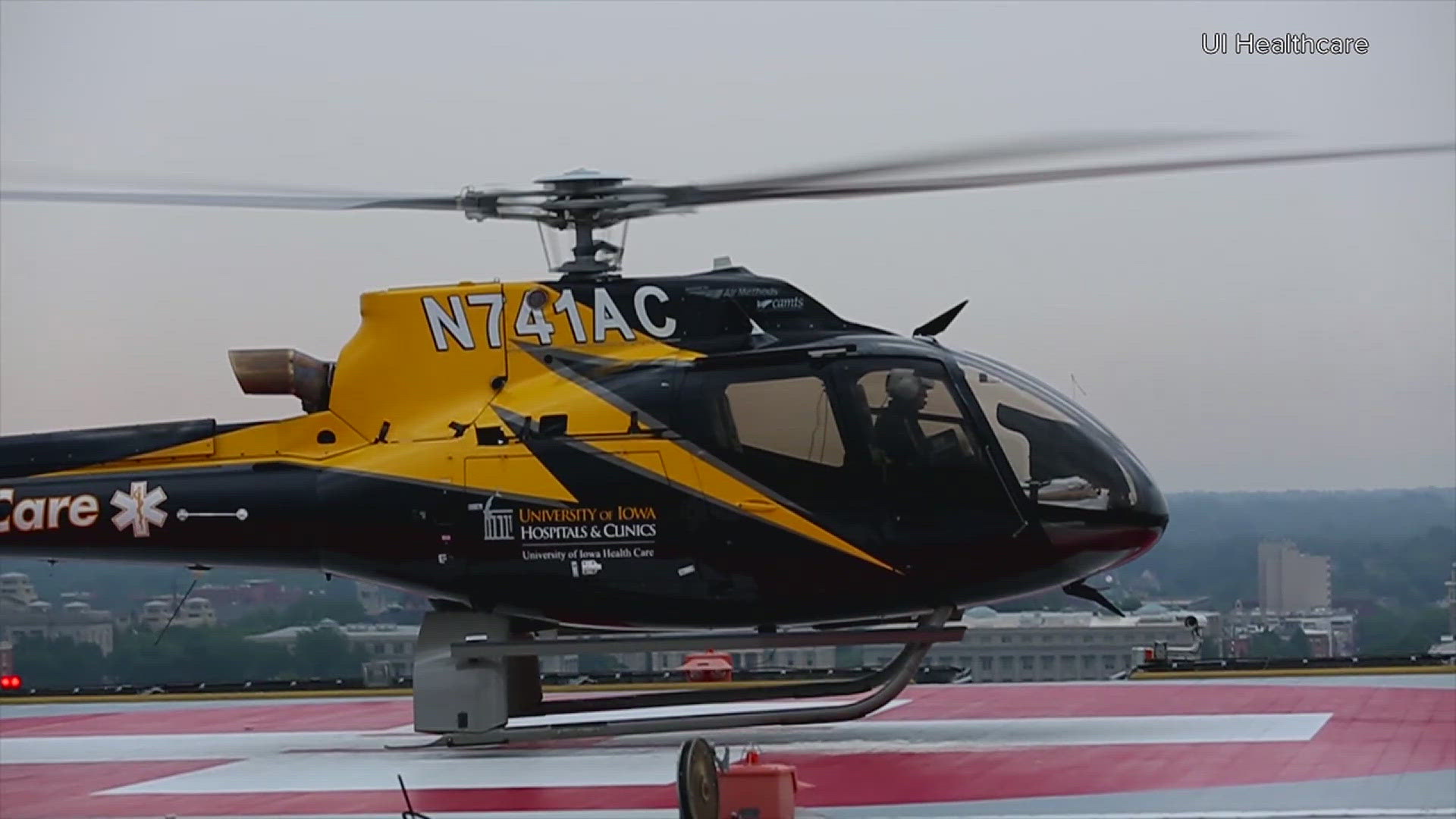DAVENPORT, Iowa — University of Iowa Healthcare is expanding its services in the Quad Cities. Its fourth AirCare base will be opening in Davenport this fall.
AirCare is UI Healthcare's air EMS system. It transports about 1,000 patients a year between medical facilities and from the scene of accidents. The majority of patients have an urgent medical need like a traumatic injury, neurological injury or cardiac issues.
Greg Martin is the assistant director of the upcoming Davenport base.
"It's just kind of moving some of our resources even closer to provide that life-saving care pre-hospital for the residents of the Quad Cities," Martin said.
An increasing need for air medical services
He said UI Healthcare saw a need for more air EMS in the Quad Cities. That extends to rural ambulance services, which he said are struggling to find volunteers.
"We do see an uptick in them calling us to transport some of these patients because they simply are short-staffed," Martin said.
UI isn't the only one seeing that increased demand.
Kevin Takacs is president and CEO of MedForce, a non-profit air EMS provider based in the Quad Cities. He says MedForce flies about 1,200 patients a year. He's seen the same trend first-hand.
"We in the emergency medical world have seen a depletion in resources, especially with ground ambulances," Takacs said. "They're hard to hire staffing for it, and they're becoming less and less."
When a local ambulance can't respond to a call, the call is sent to the next available ambulance. That could take longer to reach the patient, who might not have the time to wait.
"Every minute that goes by without any basic life support, your chances of surviving cardiac arrest go down by 10%," Dan Sterner, Durant Ambulance Service chairman, said. "Minutes matter, and so if you're waiting for an ambulance to come from a nearby town, those are very valuable minutes that you're losing out on."
News 8 spoke to Sterner earlier this month. He said the Durant Ambulance Service won't renew its emergency transportation contracts with neighboring cities if it can't find more volunteers. The service responds to more than 520 calls a year, but currently only has nine medical volunteers.
It's one of the 60% of Iowa ambulance services staffed entirely by volunteers.
"If we keep missing calls, we have to do what's in the best interest of our community," Sterner said.
But Takacs said that's where air EMS steps in.
"We seem to be filling a niche, and we work very very well with our first responders," Takacs said.
Soon, another air EMS will be available to fill in. Martin said the AirCare 4 base in Davenport is expected to open this fall. It will then follow a six-month phased approach.
"We’re excited about it, we’ve got the clinicians in orientation right now getting trained, so we’ll be ready to go and we look forward to getting out and seeing everybody," Martin said.
Differences in billing
While AirCare and MedForce serve a similar number of patients, their billing practices are different.
MedForce is a non-profit provider. Takacs said his company charges based on the cost of the service, not to make a profit.
He said MedForce receives documents from major health insurance carriers every year. Those documents tell providers how much insurance will pay for certain services.
"We never penetrate that ceiling, because I feel like number one, not only do we provide excellent care for our communities, but we also have a fiduciary responsibility, too," Takacs said. "If you sustain major injuries, major medical issues, and then you get a bill that is even worse than that, what’s the point?"
Those big bills are less of a risk now than they were in the past, though.
The No Surprises Act went into effect in 2022. According to the Centers for Medicare & Medicaid Services, the law set out rules "to restrict surprise billing for patients in job-based and individual health plans who get emergency care, non-emergency care from out-of-network providers at in-network facilities, and air ambulance services from out-of-network providers."
That means any air ambulance service, regardless of whether it's in your insurance network, can't give patients the bill their insurance won't cover.
That includes Air Methods, the company that operates UI Healthcare's AirCare. In an email, it said air medical is typically covered by health insurance providers. It said patients are only responsible for their "standard in-network deductible and/or co-insurance."
Air Methods said the average out-of-pocket cost for AirCare patients is about $200, but they said the patient's insurance plan changes that.
Medicare will also cover air ambulance services if a patient needs "immediate and rapid transport that ground transportation can’t provide."
When it comes to recovering unpaid bills, Takacs said MedForce doesn't use collections agencies. He told News 8 that he forgives millions in medical bills every year. He said MedForce also doesn't charge county agencies for assistance in search and rescue operations.
Air Methods said it uses "third-party assistance at a regular interval" to recover unpaid bills after a patient has been transported. It said the collections agency can help Air Methods identify patients and set up payment plans with those patients.
If a provider sends a large bill to an out-of-network or uninsured patient, the patient can start a dispute process under the No Surprises Act. You can learn more about that process on the Centers for Medicare & Medicaid Services website.
However, the No Surprises Act doesn't cover ground ambulances. A 2022 study by FAIR Health found the average ambulance ride with advanced life support cost more than $1,200 in 2020. With basic life support, it costs nearly $1,000. Without protection from surprise billing, patients are on the hook for the portion of the bill not covered by their insurance. That can be even higher if the ambulance service is out-of-network.

